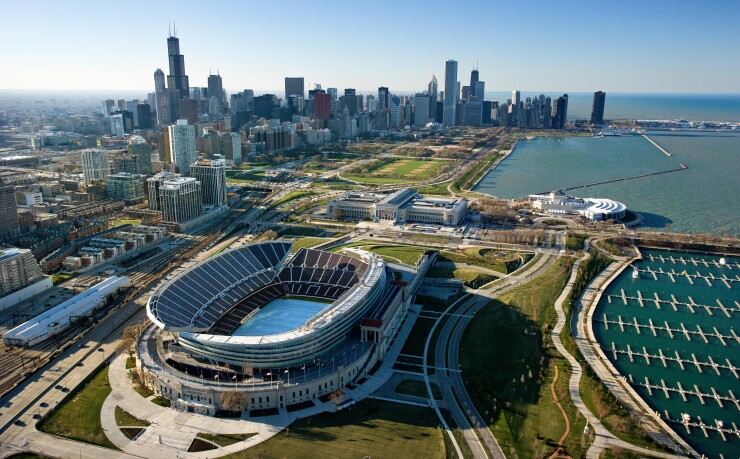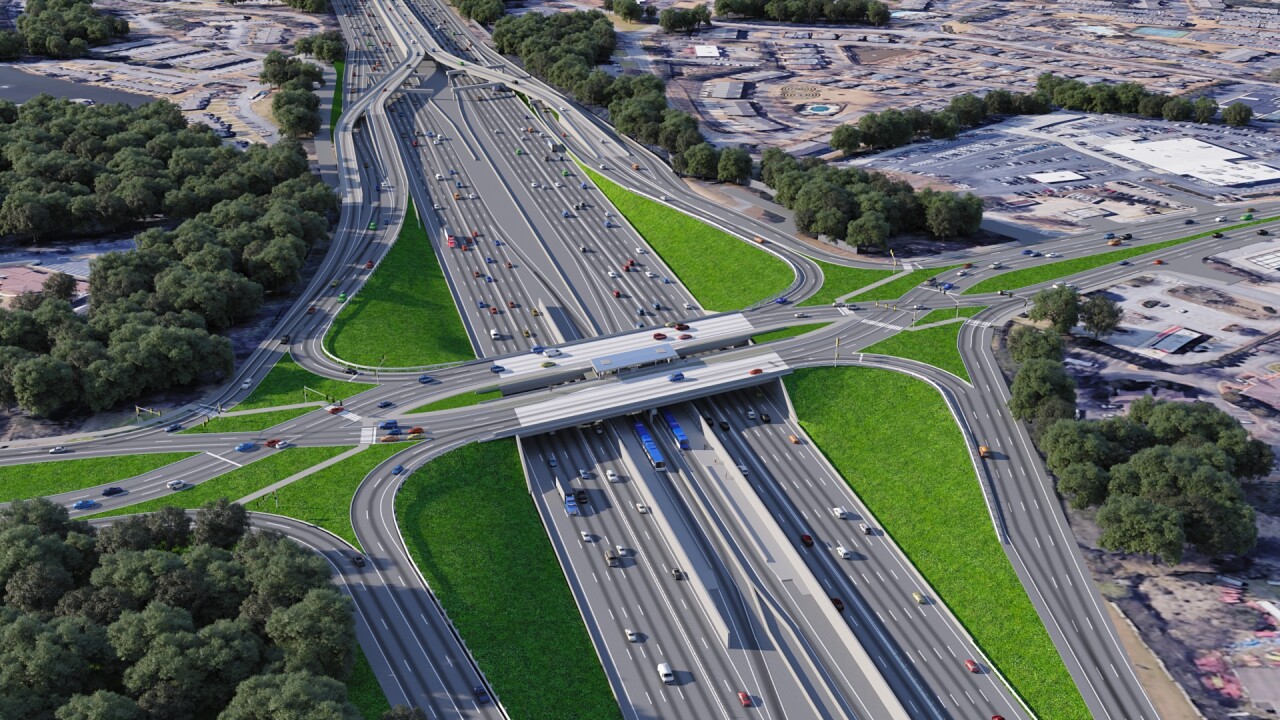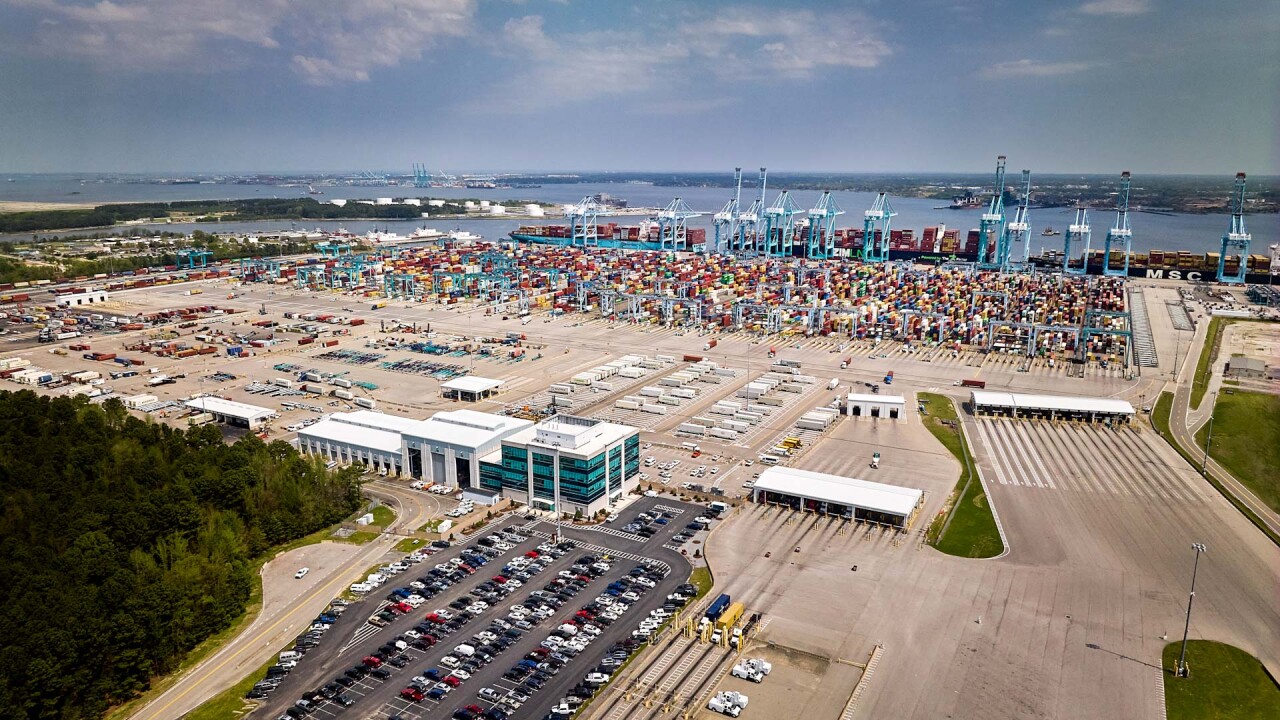Chicago hotel taxes pledged to repay Soldier Field renovation bonds will fall $9 million short of what's needed for debt service this year, leaving the city on the hook for a
A current refunding is expected next year using existing authority to push out the final maturity by one year to 2033, which would ease some of the pressure on city coffers, but new authority is needed for a more comprehensive solution, says one key official.
"I think the longer term fix is to look at legislation that would allow us to extend the debt," Illinois Sports Facilities Authority Chief Executive Officer Frank Bilecki said in an interview. "It's a win-win" for the city, and ISFA. It would solve a multi-year question mark."

ISFA sees an additional five years as needed to smooth out a steeply rising debt service schedule, but that would require state approval. While the structure would remain in place, the city and state would be refunded for their $5 million subsidies.
Bilecki is talking with Gov. J.B. Pritzker's office and lawmakers but it's unclear if action will be taken before the current legislative session ends. It's scheduled to end Friday but could run longer with a fiscal 2024 budget still to complete and other priority agenda items to wrap up. Columbia Capital Management LLC is advising the ISFA.
The discussions are taking place in the shadow of Soldier Field's primary tenant, the NFL Chicago Bears, developing a new stadium in the suburbs.
Chicago Mayor Brandon Johnson, who took office Monday, and his incoming chief financial officer, Jill Jaworski, who starts in the coming weeks, have not weighed in.
Bilecki said it's too early to forecast a potential shortfall for 2024 and the agency is hopeful for a continued recovery in hotel tax collections with positive signs on the horizon as the convention business picks up and big tourist events are scheduled including the 2024 Democratic National Convention and a new NASCAR auto race in central Chicago. At the same time economists warn of a recession.
Hotel taxes are not expected to recover to pre-pandemic levels until at least 2024 while debt service grows annually.
The ISFA has about $415 million of outstanding debt mostly tied to the 2003 reconstruction of the Chicago Park District-owned Soldier Field to benefit the Bears. Much of the debt issued in 1989 for the authority-owned Guaranteed Rate Field, home to Major League Baseball's Chicago White Sox, has been retired.
With interest, ISFA owes $743 million of debt through 2032. Debt service this year totals $53.5 million and rises to $56.8 million next year. It hits $60 million in 2025 and $64 million in 2026 before holding steady at $67.5 million for three years. It then ramps to $78.6 million in 2030, $86.5 million in 2031 and $90.5 million in 2032.
The authority's 2014 bonds become callable next year and the state budget signed in 2021 gave the authority room to extend debt to 2033 from the current cap of 2032 by keeping the state's "advance" on hotel taxes in place a year longer.
The additional one year doesn't provide much breathing room and likely would still leave the city to cover shortfalls because of the growing debt service payment ramp. "It doesn't the solve the total impact," Bilecki said.
The current repayment schedule is tied to when Bears' lease to play at Soldier Field expires. Though the team is eyeing a move to the suburbs, and reportedly
The authority grappled with shortfalls after hotel taxes plummeted amid the pandemic.
Initially, the authority dipped into its own reserves and then pushed off debt service through a $19 million
The use of reserves contributed to a downgrade and board members considered further restructuring within the confines of the current debt schedule a credit risk, so the onus last year fell on the city to cover a $27 million shortfall.
Under the original 2001 deal Mayor Richard M. Daley struck to renovate the historic downtown stadium,
Under the complex structure a "state advance" of up to 60% of a 5% statewide hotel tax is pledged to the bonds but the agency must repay most of that advance at the June 30 fiscal year end. The authority's revenues come from a local 2% hotel tax, a $5 million annual state subsidy and a $5 million city subsidy.
The state can automatically withdraw the amount needed from the city's share of income tax revenues that flow to what's known as the Local Government Distributive Fund to cover any gap. The city received about $359 million in LGDF revenues in 2021.
Besides last year, the only past deficiency in the ISFA hotel tax occurred in 2011 when the city had to cover a $185,000 shortfall.
"Talking with our financial advisor there weren't really any other options for this year" like a restructuring or reserves because of the potential ratings impact, Bilecki said of this year's anticipated $9 million draw.
The authority's board, a mix of city and state appointees, approved what's known as the "chairman's certificate" Monday. It notifies the state of the "advance" amount of hotel taxes are needed to cover debt service and operations.
ISFA's request for the full amount last year along with the ongoing hotel tax recovery helped lift its bonds out from an S&P Global Ratings junk rating.
When the authority opted not to request the full amount in 2020 to shield the city from making up the shortfall by using reserves, S&P had knocked the rating down to BB-plus from BBB. Plummeting tax revenue also contributed.
S&P caps the rating at one notch above the state under its priority lien criteria that takes into account the credit quality of the obligor where taxes are distributed and/or collected and the strength of the security pledged. The state is rated A-minus.
Fitch Ratings last affirmed the bonds' BB-plus rating in June. Because of the need for a state appropriation on the advance, Fitch caps the rating at one notch below the state which is currently BBB-plus with a positive outlook.
The Chicago Bears are pursuing a stadium project in the northwest suburb of Arlington Heights, where the franchise spent $197 million to purchase the shuttered Arlington International Racecourse.
It's not seeking direct public subsidies to finance construction, but the team does have its sights on state legislation that would provide property tax certainty for the stadium and more expansive mixed-use entertainment development by freezing values and allowing for negotiated decisions on payments to local taxing districts.
The
The legislation being led by Rep. Marty Moylan, D-Des Plaines would impose a 3% surcharge on online sports betting at the stadium complex and divert some sales, liquor and hotel taxes to fund infrastructure improvements in the region.
A $3 per-ticket surcharge would go to repay Chicago for the subsidies it's provided to repay the Soldier Field debt. It would not go directly to repay remaining bonds as some have reported, Moylan said in an interview.
State Rep. Kam Buckner, D-Chicago, noted the outstanding debt and the city's expected loss of amusement tax revenues if the Bears move.
"I think it's important to also talk about the loss of that tax revenue from the amusement sales tax," he said.
Moylan acknowledged those concerns and said negotiations over the summer would take them into account with the goal of reaching agreement on a package ready for a vote in the fall veto session.
"This bill would help fuel the biggest economic development project in the northwest suburbs but equally important it would be another valuable tool for developers of megaprojects across Illinois to create tens of thousands of jobs and spur massive economic growth," Moylan said.
The Bears said in a statement that the legislation "provides an excellent foundation" to work closely with businesses, labor leaders and concerned municipalities.
Johnson has said in public comments that he'd like to negotiate with the Bears in an effort to keep the team in the city.





